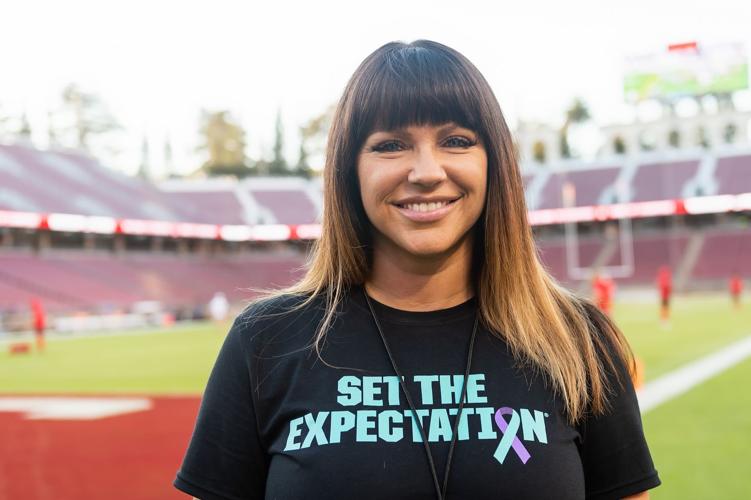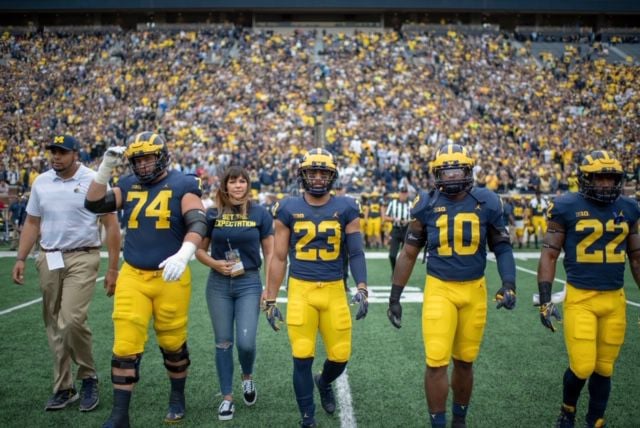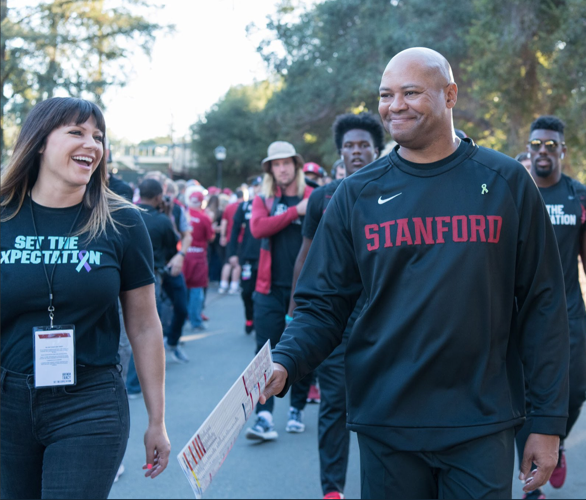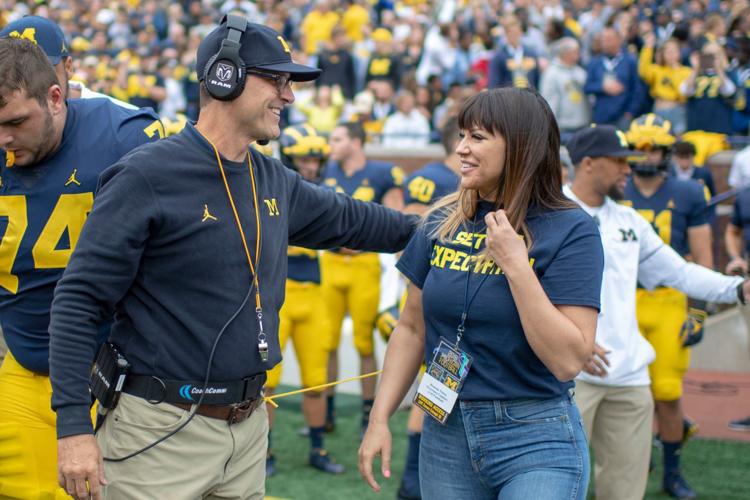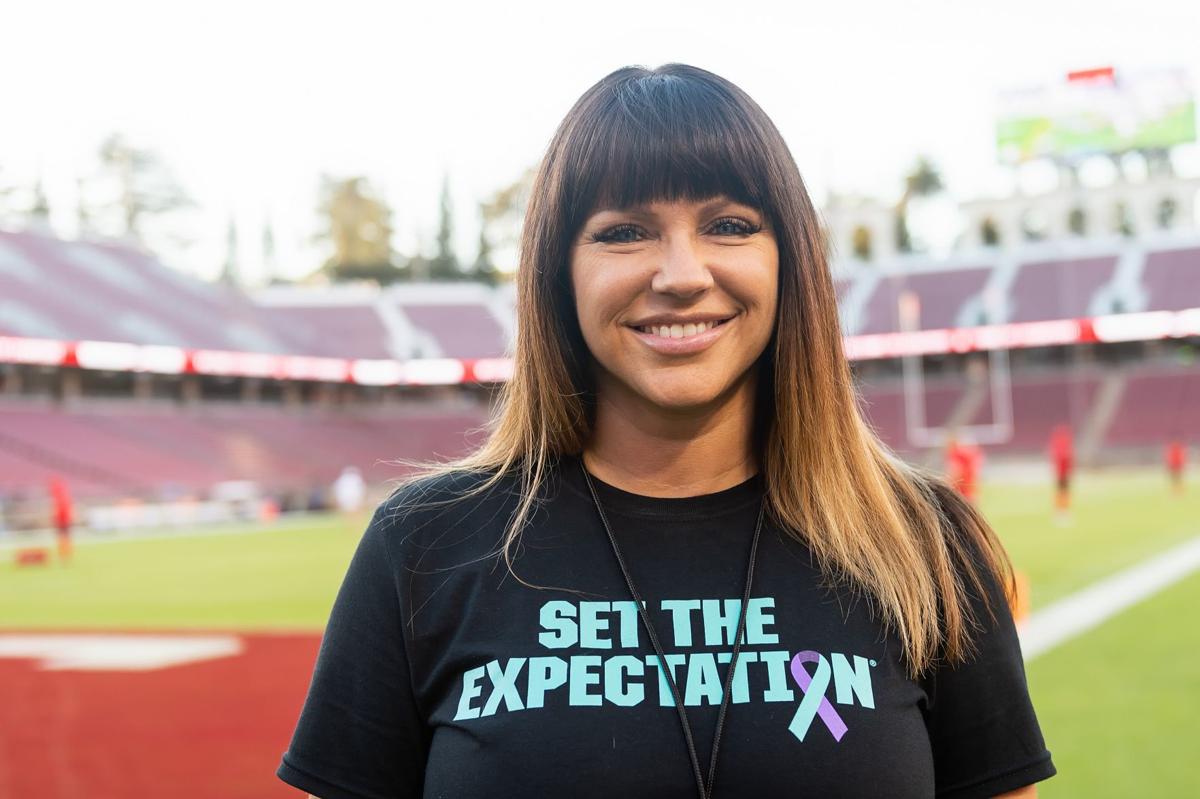PHOENIX — Sports was a haven for Brenda Tracy during her middle and high school years, with volleyball and basketball pulling the long-limbed adolescent out of her house — and head.
Tracy, 46, grew up in an alcoholic home. She said she was sexually abused by a relative as a toddler and raped at 9 by her high school babysitter’s boyfriend. She said sports saved her.
“For a child who had been abused and hurt, sports was my sanctuary,” Tracy told a crowd of 100 gathered in Phoenix earlier this month. “For a lot of our athletes, it is.”
A nurse turned activist, Tracy has risen to prominence in recent years with her nonprofit and education campaign, Set the Expectation. Tracy is in the unusual position of being best-known for the worst moment of her life: In 1998, Tracy, then 24, accused four Oregon State students — including two football players — of gang rape. All four men were arrested, but prosecutors told Tracy that her case would likely result in four acquittals, and she dropped the charges. Tracy’s identity was kept out of media coverage until 2014, when she went public.
Twenty years later, Tracy is using her experience to bring about change in college athletic departments. She admits to having a complicated relationship with an entity that has brought her both extreme joy and pain.
“It’s not lost on me that the machine that I feel like built the men that raped me is the same machine I work in today,” Tracy told the Star after the Feb. 13 event. “I don’t know if it’s called irony … but it feels like that machine that almost caused me to take my life is the same machine I work in today, and I’m thriving in.”
Empathetic ear for strangers

Brenda Tracy, who went public 16 years after reporting being raped by four Oregon State students, including two football players, has been working with the University of Michigan and other colleges about setting expectations for student-athletes.
Tracy settles into a cushioned chair off the lobby of the Embassy Suites in Tempe. Within moments of exiting the Women of Strength Ambassador Brunch where she served as featured speaker, Tracy had removed her 3-inch heels. The break was fleeting: Within minutes, she was back on her feet — speaking with an attendee who was touched by Tracy’s story. She said this type of interaction occurs regularly.
This is Tracy’s life now. She’s on the road 40 weeks out of the year, where she serves as an empathetic ear for complete strangers. It’s a role Tracy cherishes. But she admits it took a long time to get comfortable sharing her story. Still, Tracy says now, she wouldn’t change a single part of her harrowing experience.
Tracy said that as a teenager, stepping onto the court for practice or a game was really the only time and place she felt like she mattered.
“People literally cheered for me, they loved me,” Tracy said. “And I enjoyed all the privileges that athletes get.”
That all ended when Tracy got pregnant as a high school senior and chose raising her child over the promise of an athletic scholarship. Tracy married the baby’s father and had a second child, but her then-husband was physically abusive. A few years later, Tracy began dating an Oregon State football player. She went to a party one night with a friend who was dating another player. That’s where, she said, she was gang-raped.
Tracy struggled for years coming to terms with what happened to her, but says she wouldn’t trade it.
“I came to that realization about a year ago,” Tracy said. “I wouldn’t change anything, because I’m now using that pain for a purpose, and I can use that pain to help other people. It’s my calling.”
“Predators hunt where they’re safe”

Brenda Tracy, sexual assault survivor and advocate, with Stanford football coach David Shaw. Tracy will be visiting Stanford for the third time next month, to talk to football players about her educational campaign surrounding sexual misconduct.
In 2017, Tracy launched Set the Expectation, a nonprofit and national campaign asking college athletes to sign a pledge that says they’ll be dismissed from their teams if they engage in behaviors including “rape, sexual assault, physical violence, domestic/dating violence, stalking, bullying, hazing, and taking or sharing photos and videos of a sexually explicit/violent nature.”
Athletes set the tone for the rest of campus, she said — and she’s spoken to plenty of them. Tracy said she’s spoken to students and teams at 90 schools, including Arizona State, Northern Arizona and Grand Canyon. She has not visited the UA.
“I know people have been trying to get me on campus, but it hasn’t happened,” Tracy said. “University of Arizona is the only school (in the state) I’ve really had like no interaction with at all on any level.”
The athletic department has brought in other speakers to talk to student-athletes, including former Olympic swimmer Amanda Beard and, more recently, former NFL player Byron Hunt. Hunt spoke during a mandatory all-campus presentation on sexual misconduct and violence prevention. The UA athletic department’s Title IX liaison, Krystal Swindlehurst, said the department was focused over the last year on utilizing experts from within the UA’s newly created Division of Equity, Inclusion and Title IX but are looking for more external options as they continue to “balance the benefits of internal resources and external expertise.”
Still, Tracy praised UA football coach Kevin Sumlin. She said she she saw him speak at a Nike coaches conference and liked his message, which included information about acceptable behavior and creating expectations for his players.
“Its kind of a no-brainer, I kind of feel like with where Coach Sumlin says where he stands, he should be bringing me or someone like me in,” Tracy said. “If you’re not engaging men on campus, you’re spinning your wheels.”
To that end, Tracy said she’s interacted with most college athletic programs, either by visiting campus or communicating with coaches, members of the athletic department or administrators. Schools don’t have to invite Tracy onto campus in order to participate in the campaign: Set the Expectation pledges are available to download from the campaign’s website. Her website also includes a template for the landmark “Tracy Rule,” which requires athletes to disclose disciplinary proceedings into their conduct and requires Title IX coordinators at the athlete’s previous colleges to certify if the athlete was involved in any investigations related to violence. Those found responsible for offenses are disqualified from playing sports, although athletes can appeal the decision through an advisory committee.
In September, University of Texas at San Antonio became the first school to adopt the Tracy Rule. Last month, Slippery Rock University told USA Today that it would also be adopting the rule, after a USA Today Network investigation found that 33 athletes since 2014 had transferred to new schools after being found responsible for sexual offenses.
Tracy praised UTSA for creating a culture change on campus, saying the school actually made the so-called Tracy Rule even stricter. Stanford has made Set the Expectation a regular part of its football program, with Tracy preparing to visit campus for the third year. It also hosted Tracy during a football game. Tracy has spoken to student-athletes at Oregon, Oregon State, Washington, Colorado, Stanford, USC and Cal, and to officials at UCLA and Utah.
Still, “overall I can’t say that there’s a school that’s ‘gotten it,’” Tracy said. “All the (sexual assault) rates are still the same at this point.”
Tracy said that in order to create change, colleges have to start engaging the good men on campus. She says that while men are responsible for most sexual assaults, most men will not commit a sexual assault.
“Predators hunt where they’re safe and we have to create spaces that aren’t safe for them,” Tracy said. “What predator wants to be on a Set the Expectation team? Signing the pledge, filling out the forms for the Tracy Rule, raising awareness, giving back? Predators don’t want to do that.”
“You can see the evolution”

Michigan football coach Jim Harbaugh with Brenda Tracy, a sexual assault survivor and activist. Michigan has been actively involved with Tracy’s educational campaign, Set the Expectation, since its start in 2017.
Tracy spent two years on the NCAA’s commission to combat sexual violence, recommending that they tie eligibility requirements to behavior. The board of governors refused, so Tracy opted to continue her activism on another front.
She’s been working with U.S. Representative Donna Shalala’s office to create an independent study on the NCAA’s accountability (or lack thereof) regarding athletes accused or convicted of sexual assault. The NCAA’s 440-page manual addresses everything from drugs to grades to accepting money and free meals, but not a single sentence deals with sexual violence. Tracy, Shalala and U.S. Representative Ross Spano want to change that.
In late December, Shalala and Ross introduced a bill to create the Congressional Advisory Commission on Intercollegiate Athletics Act, establishing a two-year independent commission to review a variety of NCAA issues, including name, image and likeness rights and sexual misconduct.
With the Set the Expectation campaign in full effect, Tracy is looking to branch out and try to reach other audiences, including the military and professional groups. She said that the burden shouldn’t just be on survivors to help change the culture.
Tracy said that she thinks there are more discussions around the issue of sexual violence than when she first told her story, which is a start.
“You can see the evolution and you can see people learning and doing differently,” Tracy said. “It’s exciting. You want the culture to move faster, but Rome wasn’t built in a day.”


